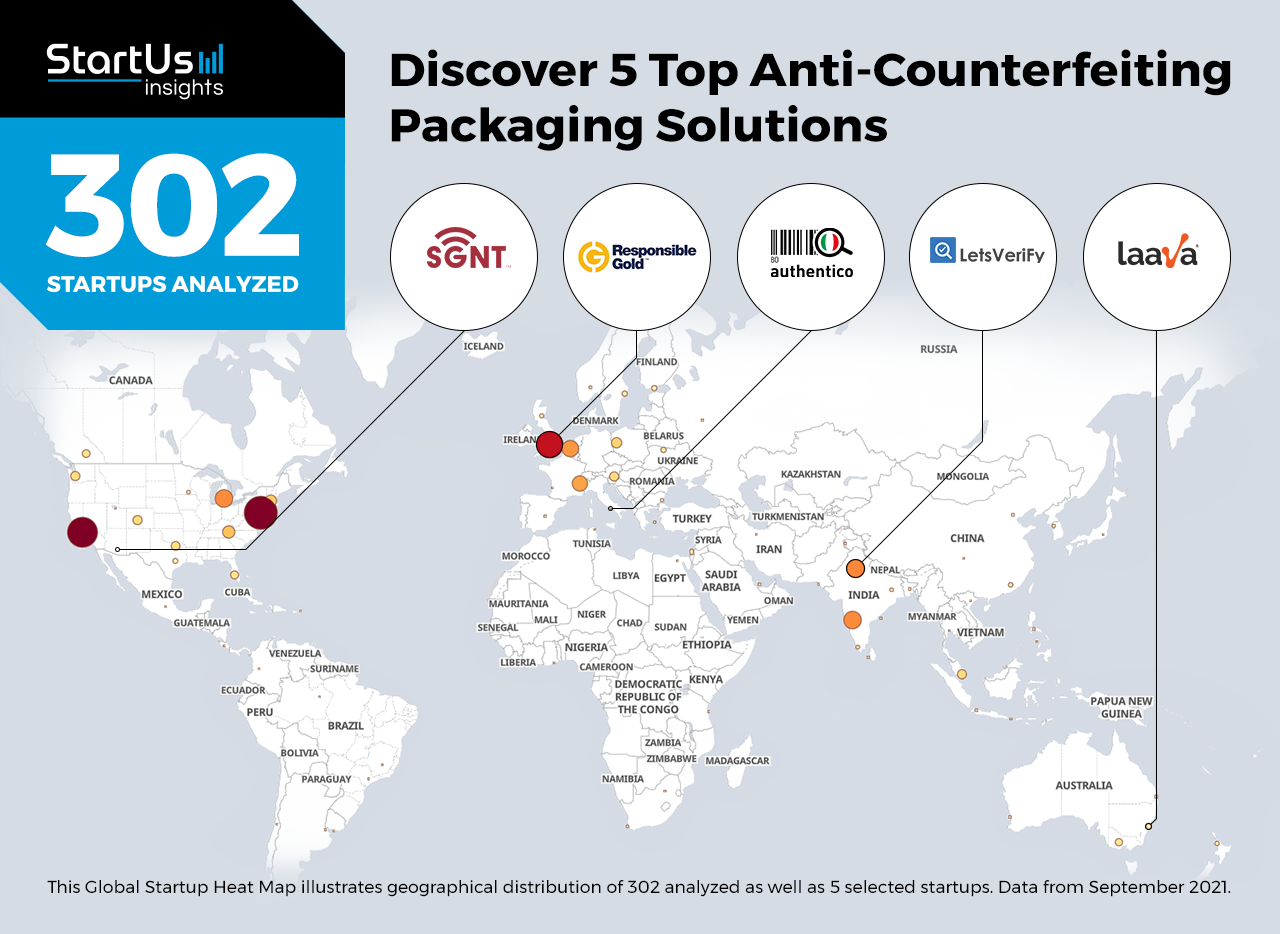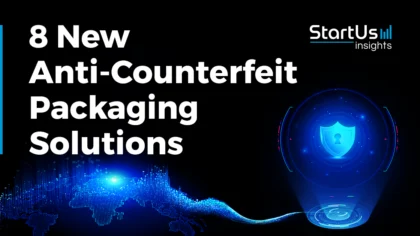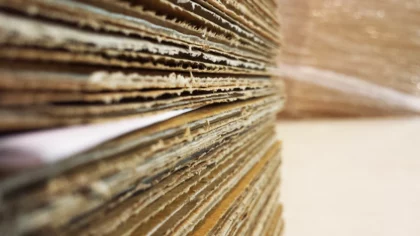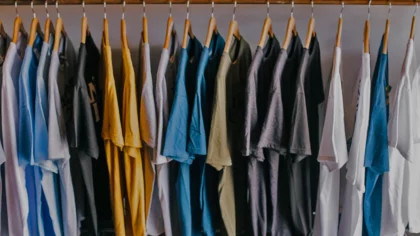Staying ahead of the technology curve means strengthening your competitive advantage. That is why we give you data-driven innovation insights into the packaging industry. This time, you get to discover 5 hand-picked startups working on anti-counterfeiting packaging solutions.
Global Startup Heat Map highlights 5 Top Anti-Counterfeiting Packaging Solutions out of 302
The insights of this data-driven analysis are derived from the Big Data & Artificial Intelligence-powered StartUs Insights Discovery Platform, covering 2 093 000+ startups & scaleups globally. The platform gives you an exhaustive overview of emerging technologies & relevant startups within a specific field in just a few clicks.
The Global Startup Heat Map below reveals the distribution of the 302 exemplary startups & scaleups we analyzed for this research. Further, it highlights 5 packaging startups that we hand-picked based on criteria such as founding year, location, funding raised, and more. You get to explore the solutions of these 5 startups & scaleups in this report. For insights on the other 297 anti-counterfeiting solutions, get in touch.
Authentico provides Barcode-based Product Authentication
With globalization, multinational sales, as well as counterfeit products, are on the rise. It is difficult for first-time consumers to pick authentic products with many products having misleading labels or limited information. Technologies like barcodes, serialization, and others create unique identities for each product to prevent counterfeiting. This is why startups develop barcode-based technology to enable shoppers to quickly obtain relevant product information.
Italian startup Authentico develops mobile-based applications to help users shop authentic Italian products across the world. The startup collaborates with Italian brands and uses barcode technology in its packaging. The startup’s application allows users to scan barcodes and recognize original Italian products. The app allows users to distinguish between authentic and counterfeit Italian food products while overcoming legislative constraints on label information.
Responsible Gold offers Blockchain-based Authentication
Counterfeiting products with a bigger ticket size leads to huge financial losses for global brands. Usually, both authentic and counterfeit products enter the supply chain via similar channels. But because blockchain technology provides individual and immutable codes for each product, it becomes possible to identify counterfeits more easily. To this end, companies use blockchain-based packaging to keep track of the products throughout the value chain.
British startup Responsible Gold uses blockchain technology and artificial intelligence to eliminate product duplication and counterfeiting in the gold supply chain. While packaging gold products at the mining sites, the startup adds cryptographic seals to the packaging. This allows stakeholders across the supply chain to validate the physical location of the product and track its status from mine to product ownership.
LetsVeriFy develops Anti-Counterfeit Labels
Counterfeit products are prevalent in the automotive industry and significantly impact the safety of various auto parts such as lubricating systems and spare parts. It is often hard to distinguish between counterfeit and original products from manual inspections. Attaching encrypted tags or labels to product packaging allows consumers to verify product authenticity. This is why packaging startups develop coded labels and tags with 3D patterns, QR codes, and other technologies.
Indian startup LetsVeriFy offers anti-counterfeit packaging solutions for the automobile sector. The startup uses its proprietary technology to manufacture unclonable 3D pattern smart labels for brands. Each label has a unique QR and 3D pattern that supports both pre- and post-shopping verification. The startup’s mobile application scans these labels to verify the product originality and report fake products.
Laava facilitates Unique Fingerprint Serialization to Replace QR Codes
Usually, producers lose track of their products after shipping – which creates an opportunity for counterfeiters. Although QR and serialization technologies are popular, they are still prone to malicious attacks as data is directly encoded in such technologies. For example, counterfeiters create QR codes online instantaneously and place them on fake products. Smart fingerprint technology solves this problem by removing the data from the code and turning it into a unique scannable mark. Furthermore, fingerprint encryption is compatible with the blockchain environment, making counterfeiting even harder Hence startups develop fingerprint-based smart packaging solutions to fight product counterfeiting.
Australian startup Laava develops smart fingerprint technology that generates unique ‘fingerprints’ instead of QR codes that are integrated into packaging and labeling solutions. The startup links pre-printed labels and packaging with data assigned to the products at the time of production, using batch and sequencing technology. In addition, the startup allows for on-demand printing by enabling the integration with the company’s Enterprise Resource Management (ERP) software. Smart fingerprints are also deployed in hybrid print environments by overprinting digitally on pre-printed packaging.
SGNT creates Anti-Counterfeit Seals
Apart from consumer products, product counterfeiting is a serious concern for pharmaceuticals as well. Despite various efforts by governments and pharma companies, the counterfeit drug market is growing exponentially, putting millions of lives at risk. Current labeling technologies authenticate the package but are ineffective at verifying its contents. To overcome this challenge and identify tampered contents, packaging solutions use radio frequency identification (RFID) technology.
US-based startup SGNT develops RFID tags that record and wirelessly report tampering to authorized parties. The startup’s anti-counterfeit seals create a barrier around or within a package, seal, or container. This barrier detects if the package has ever been cut or tampered with and once tampered with, it is not possible to re-assemble it. The solution secures the integrity and authenticity of the content and prevents counterfeiting. The technology integrates with existing packaging solutions as well as fits to the exterior of existing packaging in various form factors.
Discover more Packaging Startups
Packaging startups such as the examples highlighted in this report focus on digital printing, automation, nanotechnology as well as 3D printing. While all of these technologies play a major role in advancing the packaging industry, they only represent the tip of the iceberg. To explore more packaging technologies, simply get in touch to let us look into your areas of interest. For a more general overview, you can download our free Packaging Innovation Report to save your time and improve strategic decision-making.



![Packaging 4.0 : Top 9 Digital Transformation Technologies to Watch [2025]](https://www.startus-insights.com/wp-content/uploads/2025/02/Packaging-4.0-SharedImg-StartUs-Insights-noresize-420x236.webp)





